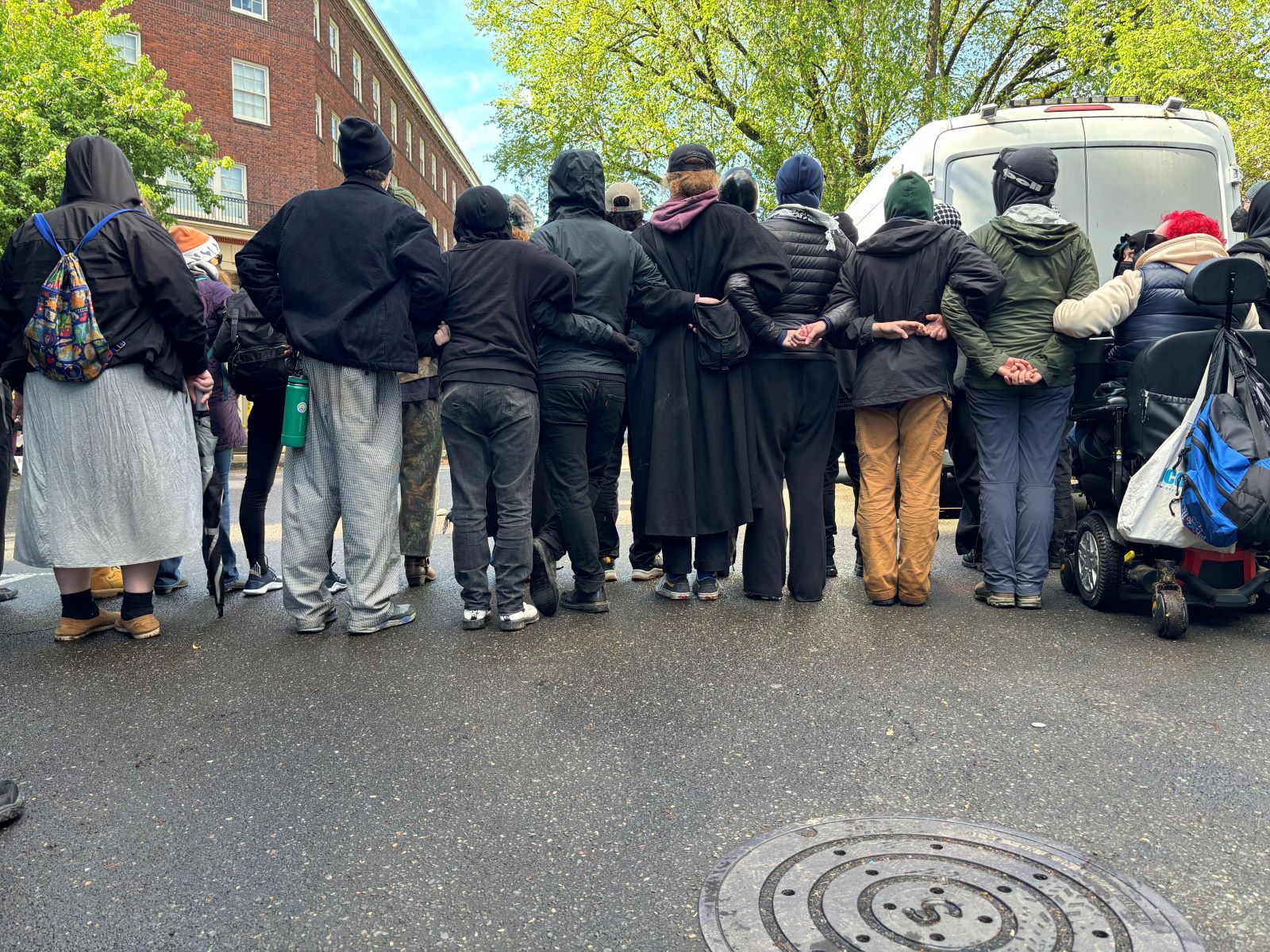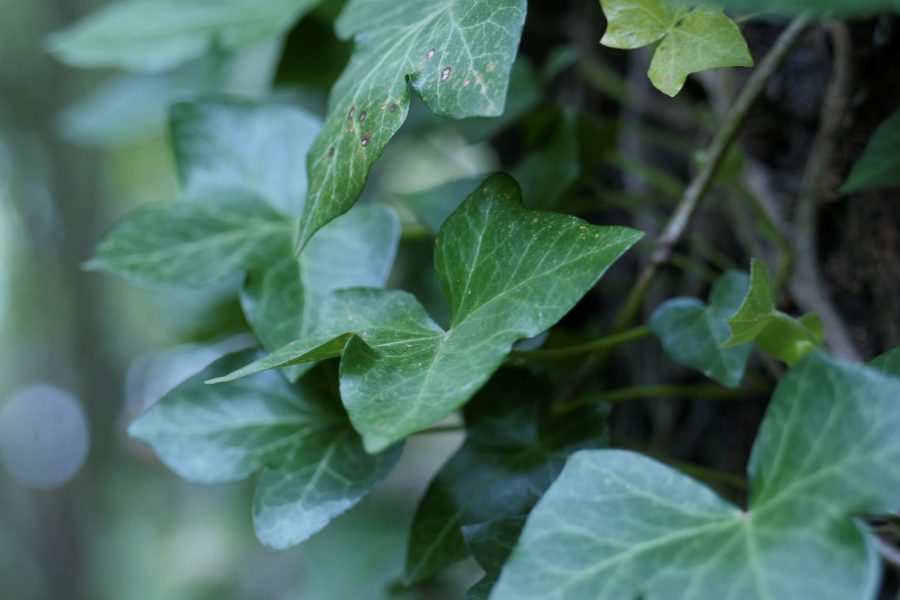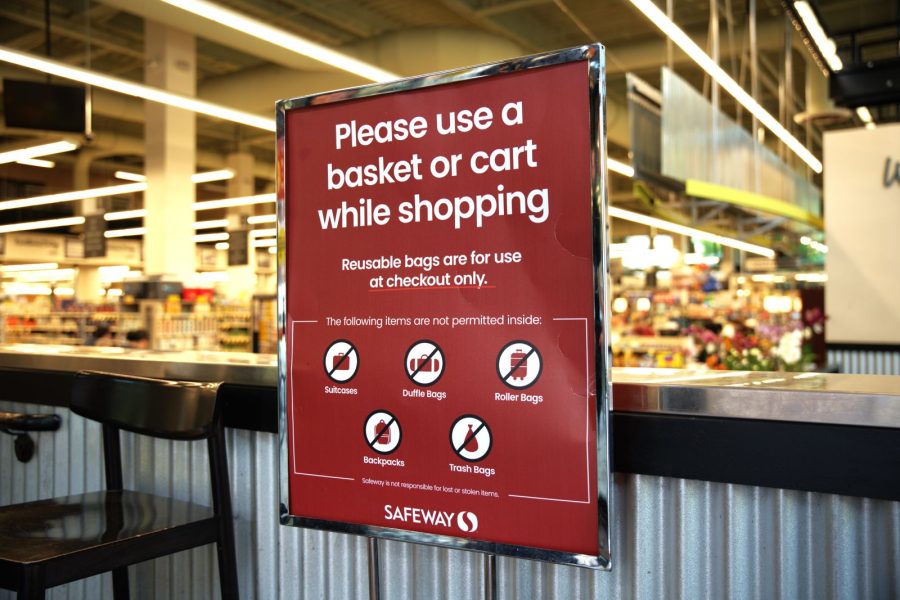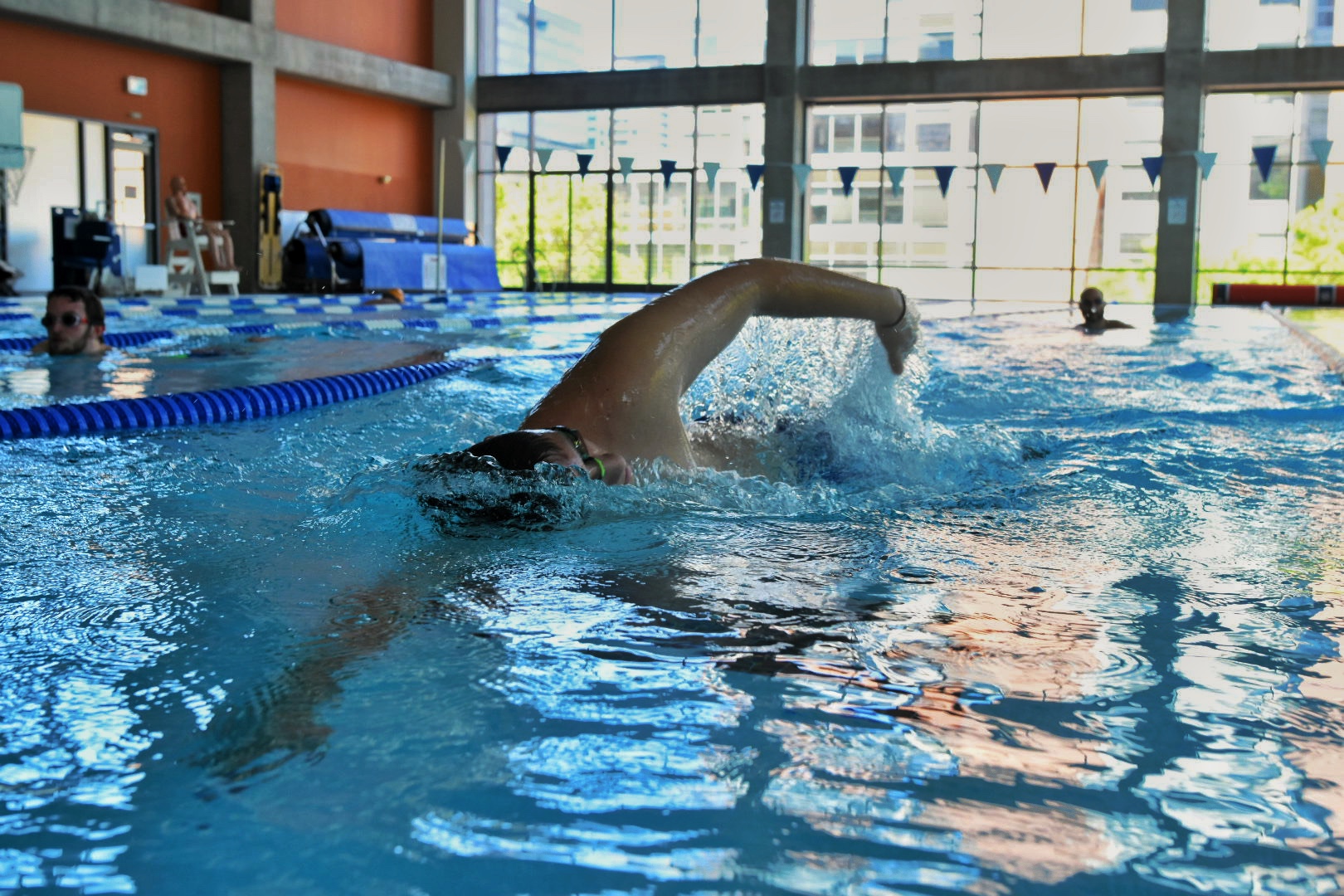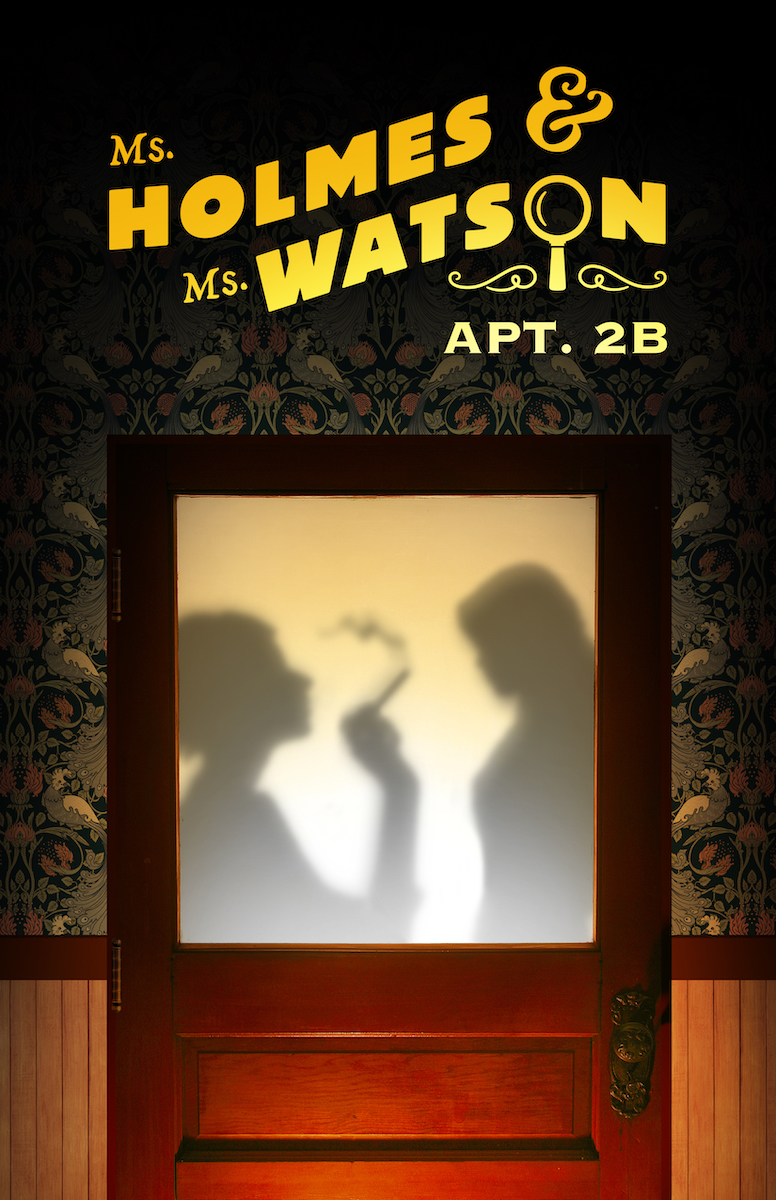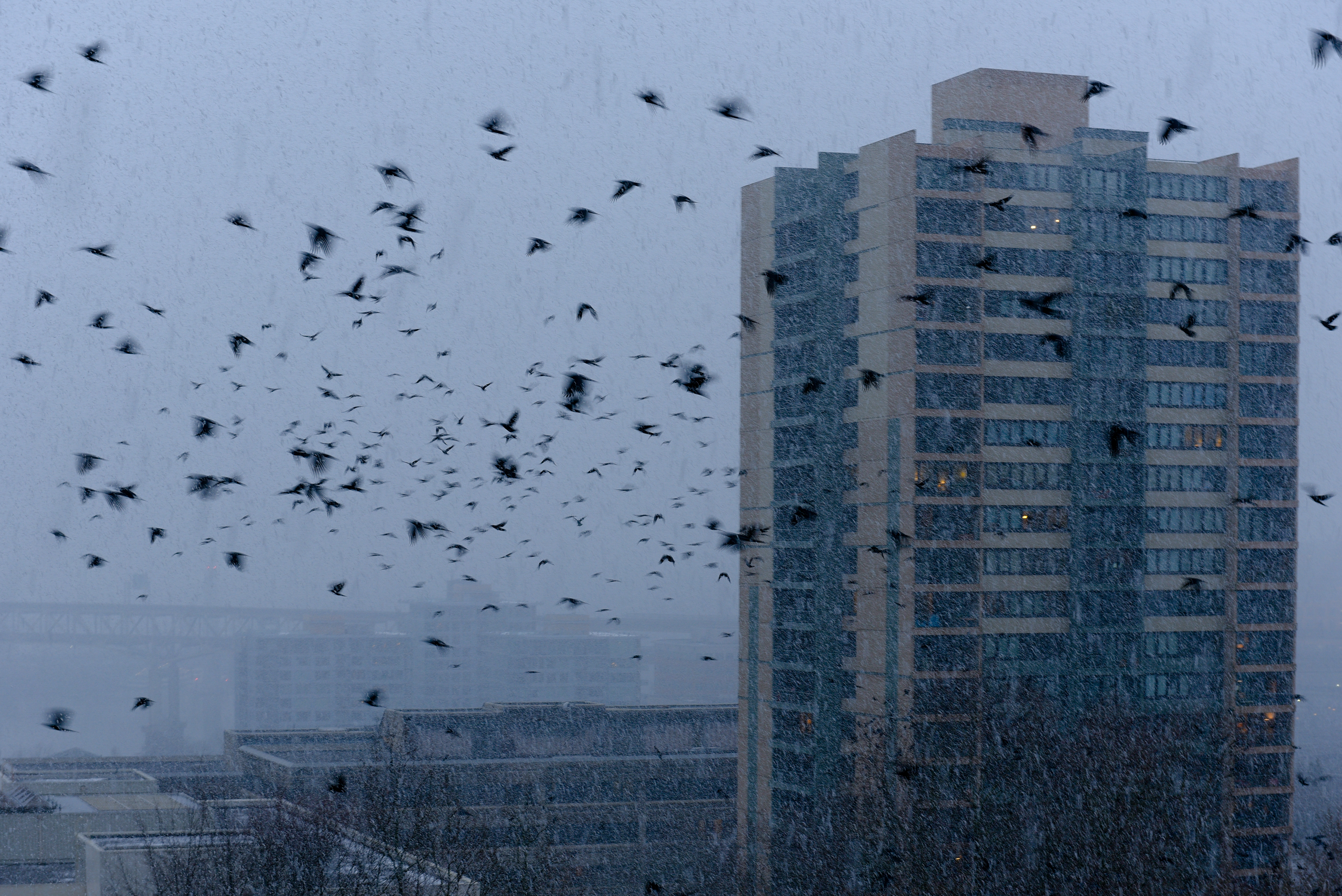This piece is part of an issue with a content warning regarding police violence. For a full acknowledgement of the content warning and source anonymity, please visit our article: About this special issue.
The occupation of Branford Price Millar library at Portland State, affiliated protests around campus and the administrative responses to those protests have affected nearly everyone in the PSU community in some way. We at PSU Vanguard recognize that not all perspectives, nor all communities impacted by these recent campus events, are represented in the following coverage. However, PSU Vanguard has made an extensive effort to seek out a range of perspectives about how these protests have impacted various communities around campus.
The community’s thoughts on the police
A repeated concern among many protestors, PSU faculty and students was police presence on campus. Many students cited the administration’s choice to involve the Portland Police Bureau (PPB) as a violation of their right to protest peacefully and an incitation of violence against students and protestors.
“Even trying to, like, return to class with this trauma of being disrupted by police,” said Arlo, a PSU graduate student. “I don’t fault anyone for not being able to come back to campus right now. And that is not something I attribute to the protesters in any way. And it’s entirely something that I attribute to my personal experience with the police being involved.”
“A lot of students, faculty and staff are in agreement with me on being horrified by the administration and the violence,” said Skylar, a student leader who attended the campus protests. “And so there’s a lot of solace in that, knowing that a lot of people feel the same way. And it’s also difficult to just go back to class—back to being a student—after being made unsafe.”
“A lot of the time that I’m on campus, I am able to connect with other students that are in agreement with the cause, experienced the violence last Thursday, and by connecting through word of mouth about that,” Skylar said.
Students have pointed to the incident in which a person had driven their car into the protesters as an instance in which the police presence could have mitigated danger but failed to do so.
“On Thursday, when we saw this car pull up, threaten students and then obviously assault with the bear mace, there was no intervention by the police in that moment,” Skylar said. “There was very little intervention once the person was arrested, and how can I be expected to feel safe on campus when that happens?”
The police presence proved particularly disturbing for students living on campus. Lark, a student who lives in Blackstone, was arrested during the height of the campus protests for crossing the perimeter tape line which police had set up on the steps of their dorm.
“It just got loud outside, and so I went down,” Lark said. “I was on the phone with my mom, because she was asking what was going on. And so I was out there and I went to just like kind of look at what was happening… long story short, [I] ended up getting arrested standing in the entrance of my dorm.”
Lark explained the police had situated the tape line on the dormitory entrance. “I, yeah, just got on the other side of it,” Lark said. “I didn’t have any intention of getting involved in the protest just because, as pathetic as it sounds, I had a lot of homework due.” Lark ended up being detained for eight hours.
Before PPB arrived on campus on Thursday, Campus Public Safety Office (CPSO) officers were on campus on Monday after a campus rally, escorting students from all closed buildings and classes. Basil explained they were in class when CPSO officers told the 60 students they needed to evacuate quickly, yet students were not informed what the danger was. “It was very intimidating, and it was the first time I felt unsafe on campus,” Basil said.
“To make matters worse, when I met up with classmates to arrange safe rides home I found out that one of my classmates was chased by the police on their way back from the bathroom and another was locked out of the building,” Basil said. “Had we been in real danger, PSU and PPB would not have protected us.”
The community’s thoughts on campus impacts
Even for those students who were not directly impacted by the police, the protests or the administrative action in response to the protests, many still expressed frustration. With the campus closed, many classes canceled and the library unavailable, many students felt disenfranchised.
“I could have easily gone to class today, and there’s no reason to have closed the entire campus,” said PSU student Justin, during the campus closure. “It’s nonsense.”
Another student, Henry McDowell, expressed disappointment in the occupation of the library space. “Destroying the library hurts students at least as much as it hurts the administration, and students have a lot more to lose,” McDowell stated. “For the record, I support Palestine, and I believe Israel is clearly committing a genocide, but I cannot support what happened here.”
“The destruction is expensive and deprives our students of a critically important learning and study space,” said President Ann Cudd in a faculty senate meeting on May 6. “The unrest, destruction and vandalism of our university, it harms our reputation and hurts enrollment.”
A collective of Masters in Social Work students for Palestinian Freedom emailed their own fears and grievances with the school. Various students in the program felt frustrated with the administration, with one anonymous student mentioning that if they “had not already sunk so much money into their education, [they] would not be returning.”
The frustration reflects some students’ desire to no longer have connections to the school. “Following last week’s events and PSU’s continued refusal to divest from genocide, they have ruined their reputation as a recommended school from both alumni and current students,” the collective wrote.
“As the president of this university, in my view, we should not condone or accept a community that embraces vile messages that so deeply wound other members of our community,” Cudd said in the senate meeting.
The community’s thoughts on antisemitism
Many Jewish or Israeli members of the PSU community have expressed feeling hurt, targeted and ostracized by the local protests and the library occupation. They point to some of the slogans and chants repeated by protestors and graffiti in the library as examples of rhetoric which they believe is actively perpetuating harm against their community.
“I don’t think that there’s a lot of nuance in the protester’s side about what antisemitism is, and about what their actions are that could be antisemitic,” said Solomon, a Jewish PSU student. “They’re not coming at it specifically to pronounce Jewish hatred, but the things that they are doing have an antisemitic effect.”
Jewish students and faculty at PSU cited specific instances of encountering hate speech and antisemitism during the recent protests on campus, including protestors celebrating Oct. 7, denying the atrocities which occurred on Oct. 7, calling to “globalize the Intifada” and calling for death to Zionists, among others.
“When you have those kinds of slogans said over and over and over again, it does begin to create an atmosphere of intimidation for one particular group on campus,” said one professor in the College of Liberal Arts and Sciences who wished to remain anonymous.
“I understand that people are upset about the fact that there is a horrific war going on, and that many civilians have been killed…” the professor said. “I understand why people are upset. I’m upset about it too. But to go from there to say this entire country doesn’t have a right to exist, and anyone who associates or affiliates it with it in any way should be condemned and essentially doesn’t deserve to exist… to me, that’s obviously antisemitism.”
There has been a repeated sentiment amongst many Jewish and Israelis peoples who have spoken with Vanguard that there is a desire to participate in Palestinian solidarity communally, but they often feel unsafe and unwelcome within the Palestinian activism environment at PSU.
“The thing is, I want to be out there marching with them too,” Solomon said. “I want war to stop… but I cannot stand with people who are calling for my blood to run in the street, you know? I can’t. I can’t be out there and stand with people calling for Intifada.”
“It’s a hostile workplace,” Solomon said about the current atmosphere at PSU. “I have to walk across campus with people who don’t know the distinction between what they’re calling Zionism and what my experience as a Jew is… I’m like at a loss about how do I go to school with a population that wants me to die.”
Arden—a Jewish Israeli graduate student at PSU—agreed the rhetoric of campus protests has contributed to a university environment which makes him feel unsafe. “It’s very unidirectional,” the student said. “It’s very aggressive. It’s very—it’s scary to be on campus and just see so much hatred be an acceptable form of expression on the campus.”
Arden described a lack of open communication from student-led social activism—and on campus generally—that is inclusive to Israeli and Jewish student perspectives. “The fact that people are unwilling to engage in a debate is what’s antisemitic about the situation,” he said. “There’s an assertion of our people and our history, and no interest in hearing from the people that the assertion is being made.”
This unwillingness to engage with conversation or academia from Israeli and Jewish perspectives is felt in the Judaic Studies Department at PSU. According to Loren Spielman— an associate professor of Classical and Rabbinic Judaism—current enrollment in the program is at the lowest point in years, and flyers advertising department courses are constantly being torn down.
The Jewish community on campus do not all relate to Israel or the campus protests in the same way.
“In recent times I have, however, felt alienated, not from the school, but from other Jewish students,” said Avery, a PSU student. “Many of them refuse to recognize any malicious acts perpetrated by the state of Israel, and treat any discussion or condemnation of such acts as Jewish self-hatred.”
“I have never felt the need to mask or hide my Jewish identity,” Avery said. “In fact, I feel proud to embrace it while supporting the people of Palestine. I would go as far to say that I feel much safer as a Jew around pro-Palestine protestors, rather than Zionists who would call my Jewish identity into question for daring to speak out against Israel.”
Lyric, another PSU student, reported “feeling safe and comfortable” at the rallies held in solidarity with Palestine, and wanted to emphasize that “anti-Zionism is mitzvah,” mitzvah meaning a religious duty.
Joe—a community member who had been involved in pro-Palestinian marches in Portland—was easily identifiable in the crowd wearing a kippah and laughed at the question of feeling unsafe at pro-Palestinian events. “The only antisemitism I can think of has come from counter protesters questioning my Jewishness,” Joe said. Joe asserted there was no validity to antisemitic claims about the crowd.
Meanwhile other members of the Jewish and Israeli community on campus asserted that all voices should be heard and included in discussions about antisemitism and campus protests.
“There are some anti-Zionist Jews on campus, and that definitely needs to be acknowledged,” said the Jewish College of Liberal Arts and Sciences professor. “But I think the majority of Jews generally—and probably the majority of Jews on campus—do feel some connection to Israel. They are hurting right now. And for that reason, they need to be listened to, just as they listen to members of any other minority group who said that there was some sort of systematic problem that was causing them to feel marginalized and unsafe.”
The community’s thoughts on statements from student groups
In the immediate aftermath of the library occupation’s dispersal, many student groups put out statements detailing their organization’s stance on the issue. Many were heavily critical of the university’s cooperation with the PPB, called for a divestment from Boeing and stated their support for the student and Palestinian cause.
These groups include explicitly political organizations such as PSU Cuba Solidarity, Disarm PSU, PSU Students United for Palestinian Equal Rights (SUPER), the Progressive Campus Solidarity Union and MECHA de PSU. However other organizations also put out statements, such as multiple cultural resource centers (CRCs) and clubs. These include Associated Students of Portland State University (ASPSU), Pacific Islander, Asian & Asian American Student Center, Native American Student and Community Center (NASCC), Queer Resource Center (QRC), Women’s Resource Center, Student Sustainability Center, Pan African Commons, La Casa Latina and Learning Gardens Lab (LGL) graduate staff.
While Student Activities and Leadership Programs (SALP) recognized organizations and independent clubs were able to keep their statements on their social media accounts, many resource centers were allegedly forced to take their statements down after warnings from campus administration.
“The professional staff of the cultural resource centers received warnings from several people that our resource centers’ public statements made in the first and second weeks of May were in potential violation of university policy,” stated Remi, a student employee. “The warning given to the CRC admin argued that these statements were potentially in violation of university policy as they expressed what are considered ‘personal views’ on university platforms.”
They also stated their belief that the administration’s response to these posts, in particular, is an example of a Palestine exception.
“In my own personal view, what is happening is an example of the Palestine exception, meaning the university administration is enforcing or warning that they will enforce policies that in different contexts they would not,” Remi stated. “Many of the resource centers utilize their platform to denounce other colonial situations, such as the continuing history of economic imperialism and militaristic intervention by US [United States] and European powers in the Global South and the genocide against Indigenous peoples and colonization of land in Turtle Island-Abya Yala. This is part and parcel of being educational centers. When these positions are taken within center programming, we do not receive similar warnings.”
Many student groups’ statements advocated for different things, but many echoed the same sentiments. PSU SUPER explicitly demanded the impending police sweep of the occupation be called off. “We at Super demand Ann Cudd and the PSU administration call off PPB’s planned ‘operation’ to mass arrest and criminalize protesters,” SUPER stated. “Cudd must recognize the right of all students to perform acts of civil disobedience in opposition to genocide without the threat of criminalization by PPB. We condemn Cudd’s decision to criminalize the students engaging in said protest. Involving them [CPSO and PPB] in this operation will only escalate the situation further, possibly leading to casualties.”
Many organizations’ statements made an apparent effort to center issues around Palestine in their statements, as LGL graduate staff made very clear. “Throughout the course of the protest, Ann Cudd and the PSU administrators have ignored and sidestepped the issue of what the protest is about; genocide in Palestine,” stated the LGL graduate staff.
The NASCC echoed this statement. “We also take issue with President Cudd’s language in using the term, ‘war in Gaza,’” NASCC said. “A state military’s extremely disproportionate use of force against civilians is not a war at all; it is a slaughter.”
MECHA de PSU’s statement went further. “MECHA de PSU stands in complete and unwavering solidarity with the Palestinian liberation movement resisting the ongoing occupation of their land by the settler-colonial project of Israel,” MECHA de PSU said. “We demand Portland State University cut ties with Boeing, disarm our PSU campus, and call for an immediate, permanent ceasefire in the genocidal war on Gaza. We encourage all MECHA members, all Latine students, and all allies to join the global student intifada, to voice our movement’s demands and to organize to build a sustainable and productive student movement that combats the root causes of our struggles and builds safe community-centered alternatives.”
Statements also included words of support for the student protesters. For example, ASPSU’s statement read, “We join the voices of student protestors in their demands for the PSU admin to call for an immediate ceasefire, cut ties with Boeing, sever connections with any other entities profiting from the war in Gaza.”
Another student group, PSU Cuba Solidarity, stated, “We stand with the student protestors who used their voices to demand for PSU admin to call for an immediate ceasefire and cut all ties to Boeing and other entities that profit from the ongoing genocide.”
Other statements also came with actions reflecting a hostility added with police presence on campus. The QRC canceled this year’s Queer and Trans Student of Color Conference, noting explicitly that “we are canceling the event to call attention to, honor, uplift, and shift our focus to the voices fighting for liberation of Gaza and the Palestinians people – recognize that our coexistence is inherently linked.”
The community’s thoughts on the movement
As for the students involved in the protests, the concerns of academic or legal repercussions ultimately did not outweigh the social or political change they were advocating for. “I do think that there is definitely a threat of us being expelled, of us being removed from campus and of them trying to stifle the movement for liberation,” said one member of the Portland Revolutionary Student Union group. “But it doesn’t matter. I don’t care if I’m expelled, I don’t care if I die. We are here to fight for liberation, to fight against the genocide of the people. My life is nothing.”
Phoenix—a Palestinian-American student involved in the campus protests—explained that, for them, the protests were a logical response to the university’s immoral actions. “You invest in a death cult in Boeing,” they said. “And we are not paying for it. $30,000 worth of tuition for us to invest in the massacre and horrific murder of a defenseless civilian population.”
“I can’t speak for the entire student body, but for me as a Palestinian American student,” they said. “This goes against everything and you guys are murdering my family.”
Other protestors acknowledged a global interconnectedness within their cause. “Free Palestine, this is about land back, and giving Indigenous land back to Indigenous people across the whole world, in the U.S., in the Philippines, in Palestine, in Puerto Rico,” said Jane, a PSU student.
Other students spoke about the mutual support and local community building which took place during the protests. “I’ve been really proud of students for showing up,” Arlo said. “Everything I’ve been seeing has made me really proud of people’s direction, of the objectives and of how people are bringing themselves into the space and to the conversation.”
“That is the community culture of PSU that I value, and is keeping me here in spite of the disingenuine responses by our president and by campus police and Portland police,” Arlo said. “And the vulnerability that people are bringing to show up because it is not done impulsively or lightly to go into a space knowing that police can be weaponized against you, and in such force.”
Another PSU student, Glasses explained that even though the encampment on campus was a punishable form of activism, it was a more effective form of protest because it allowed the protestors’ message to be widely heard without disruption or manipulation from outside actors. “Encampments like this traditionally are good because they are loud,” the student said.
“They bring active attention to an issue that needs attention and often it makes it a lot harder for media or corporate owned media to suppress these stories, because if it is in a place where people regularly will just walk by and notice that means that it can’t be suppressed as well because it is going to be traded through just first hand accounts, word of mouth and on social media,” the student said.
Skylar believes the actions of the protestors at PSU—and even the administrative response to the protests—will act to strengthen and expand future interest in student activism at PSU. “I really think this is a powerful moment for organizers in the movement to be able to capture anti-imperialist sentiment,” they said. “And I think at PSU, more and more students will get politically involved. More and more PSU students will get radicalized by the radical actions of the university, in calling in the police [and] in allowing them to brutalize students.”
“The administration and police’s attempt to silence us, to squash this movement won’t work,” Skylar said. “And more and more people are gonna get involved in actions moving forward to challenge and resist the university’s relationship to war profiteers.”

